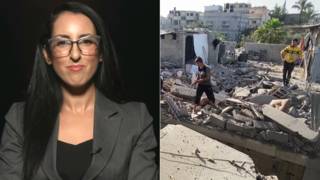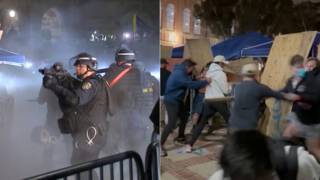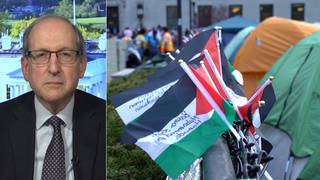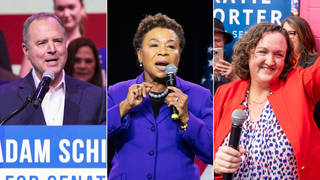
Related
Guests
- Carlos Fernández de CossíoCuba’s deputy foreign minister.
We speak with Carlos Fernández de Cossío, Cuba’s deputy minister of foreign affairs, about high-level U.S.-Cuban migration talks held last week in Washington. He says U.S. policies that expedite permanent residency for Cubans in the United States play a major role in the movement of people between the two countries, but adds that the main driver of migration is the decadeslong U.S. embargo. “The economic conditions of the people of Cuba push them to migrate, and an important fact in provoking those conditions are U.S. deliberate policies of destroying the Cuban economy and make it unworkable.” Fernández de Cossío also discusses the 2024 election and policy overlap between the Trump and Biden administrations, Cuba’s position on the U.S.-backed Israeli war on Gaza, recent protests inside Cuba over living conditions and more.
Transcript
AMY GOODMAN: This is Democracy Now!, democracynow.org, The War and Peace Report. I’m Amy Goodman, with Juan González.
High-level migration talks between the U.S. and Cuba were held in Washington last week. The twice annual meetings were suspended during the Trump presidency but resumed in 2022 by the Biden administration. The U.S. restarted deportation flights to Cuba last year after a two-year pause. Since then, the U.S. has been sending one flight with Cuban deportees to Havana each month.
Cuba has long blamed U.S. sanctions for strangling the Cuban economy and the 1966 Cuban Adjustment Act, which grants special entry rights to Cubans and support upon arrival, for encouraging its youth to emigrate.
We’re joined now in our New York studio, not far from the United Nations, by Cuba’s Deputy Foreign Minister Carlos Fernández de Cossío.
Welcome back to Democracy Now! It’s great to have you with us. If you can start off by talking about what happened in those talks last week?
CARLOS FERNÁNDEZ DE COSSÍO: Well, thank you for having me.
Last week, we had one of the regular sessions that we have as part of the implementation of the several agreements in migration that exist between Cuba and the United States. The aim of those agreements is to secure a safe, regular and orderly migration between the two countries. And they have several issues that have to be implemented for that. But there’s a given reality that is difficult to disconnect, which is the economic conditions of the people of Cuba push them to migrate, and an important fact in provoking those conditions are U.S. deliberate policies of destroying the Cuban economy and make it unworkable. Therefore, we insist and we put a lot of emphasis in saying that there continue to be a potential of Cuban migrants wanting to reach the borders of the United States as long as its policy continues to push people out of the country and as long as the United States has an inviting policy for Cubans, which enjoy privilege when they try to enter irregularly in the United States.
JUAN GONZÁLEZ: And, Foreign Minister, I wanted to ask you — the United Nations every year votes to oppose U.S. sanctions against Cuba. I think in the latest vote, only two nations in the entire General Assembly were opposed. That was Israel and the United States. Can you talk about the impact of this continued blockade and sanctions against your country?
CARLOS FERNÁNDEZ DE COSSÍO: The impact is overwhelming. The United States does not have — and no country has — a more comprehensive system of economic coercive measures against any country, nor has it been applied for as long as it has been applied against Cuba, which is over 63, 64 years ago. And if you just look at the asymmetry between the two countries, the size of the U.S. economy and the modest dimensions of the Cuban economy, you can try to understand the impact it has. It is a policy of economic warfare, trying to destroy not only the Cuban economy, but the system of social justice on which depends the well-being of the majority of Cubans.
JUAN GONZÁLEZ: And I wanted to ask you — in recent years, there’s been a greater migration of Cubans from the island to the United States than at any time in U.S. history, even more than in the aftermath of the Cuban Revolution in the 1960s. And also, the migration has shifted from going across the straits, the Florida Straits, into Central America and Mexico to the U.S. border. Could you talk about why that has happened during the — especially during the Trump and Biden years?
CARLOS FERNÁNDEZ DE COSSÍO: It’s a combination of factors. You have the fact that there are more Cubans living in the United States, and therefore there are more family connections, more friendly connections, so people find that it is a place where they will find families and groups that they know.
Secondly, the United States has a policy that privileges Cubans in a way that it does not privilege the citizens of any other country in the world. Therefore, Cubans believe that if they reach the border of the United States, by whichever means, they have very high possibility of entering.
Now, if you add to that that the U.S. has a standing policy of deliberately attacking the well-being, the standard and the living standards of the people of Cuba, attacking the economy, it is logical for there to be a push. Now, Cubans don’t see any possibility at the moment of a change in U.S. policy. Increasingly, they see that the United States plans to continue to punish their country. And therefore, a group of Cubans — not all Cubans, but a part of our citizens — leave the country. You have the half — half of Puerto Rico have left the island to come to the United States because of the economic conditions of that island, and yet that island does not suffer a policy of aggression as Cuba does from the goverment of the United States.
AMY GOODMAN: I want to ask you about the continued effects of the embargo against Cuba. And also, in November, the U.N. General Assembly called for the 31st time on the United States to end that decadeslong trade embargo against Cuba. Every country approved the nonbinding resolution except the United States and Israel — oh, and Ukraine abstained from the vote. Your response?
CARLOS FERNÁNDEZ DE COSSÍO: This is a resolution that’s been approved for the past 31 years or 32 years at the U.N., so it’s not new. The U.S. has been totally isolated. I believe that there is no other example of consistent isolation by a country in the U.N. as this one. The other would be Palestine, perhaps, is the only other subject in which there’s such level of isolation. It’s a moral message, because the U.N. does not have the capacity to lift U.S. coercive measures against Cuba.
But in addition to the resolution, over 34 heads of delegations at the General Assembly last year at the General Debate specifically requested the U.S. to take Cuba out of a very arbitrary list of the State Department that alleges that Cuba is a country that sponsors terrorism. No official in Washington — I’ve spoken with many — even takes the trouble of explaining to me why Cuba should be in that list. And the slander is not the main problem. The problem is that being in that list automatically triggers a set of additional coercive measures that makes Cuba have very serious problems to conduct our trade, our financing in any corner of the world, including countries that have a very friendly relationship with Cuba.
AMY GOODMAN: Like what? What are these issues that you have to deal with?
CARLOS FERNÁNDEZ DE COSSÍO: Banks will not give us loan. Banks will not participate in trade. So we’ve had companies with which we’ve traded for years to supply for our electrical infrastructure, for our healthcare, for transportation, that cannot trade with us anymore because the banks that they use are not ready — the banks that they use do not want to challenge the intimidating impact of U.S. policy against Cuba. And they say, “Look, we have nothing against you, but we don’t want to suffer the consequences in the United States.”
JUAN GONZÁLEZ: I wanted to ask you about Cuba’s view of what’s going on in the presidential race here in the United States. Clearly, under the Obama administration, there was an attempt to normalize relationships between Cuba and the U.S. But neither President Trump nor President Biden have done much to pursue the Obama policies. I’m wondering your sense of the stakes for Cuba in the terms of the presidential race in this country and who ends up winning.
CARLOS FERNÁNDEZ DE COSSÍO: I would say that the Trump and the Biden administration have done more. They’ve not only not done much, but they’ve done a lot to try to derail the progress between the two nations — and that was celebrated by the peoples of both countries — to improve our relationship and to work towards a respectful relationship. The impact for Cuba is tremendous.
Now, we’re not involved in U.S. elections. What we try or what we wish would happen, what we’re hoping for, is that whoever is elected in January will try to take a more reasonable approach toward Cuba, one that is fair, that will lead the government of the United States to do something that’s correct — that is correct, and allow the people of Cuba and the people of the United States to be able to engage with each other without restrictions. In the U.S., any link by Americans with Cuba is prohibited. You need a permission of the government to relate with Cuba, to travel to Cuba, to invest in Cuba. If you travel to Cuba, you need a permission of the government that will tell you where you can stay and where you cannot stay. To play golf, to play baseball, you need a permission from the U.S. government. We wish for there to be a policy that would allow Americans to freely engage with our country, as citizens of any country do or as Americans can do with any other country.
AMY GOODMAN: So, let me ask you: What’s happened? Because Obama began normalizing relations. Of course, President Obama’s vice president was Vice President Biden. So, is he going back on this? And number two, I’m wondering, as you listen to our broadcast — and you don’t need to just do that to see what’s happening in the streets of the United States around the protests around Gaza, 300 people just arrested in Brooklyn at a seder, especially Jewish activists who are concerned about the U.S. support of Israel, the Palestinians, Arab Americans, the massive youth concern about Gaza — what your perspective is and the perspective, overall, of the Global South on this issue.
CARLOS FERNÁNDEZ DE COSSÍO: So, two different questions. On the first, we expect the government of the United States, the Biden administration, not to faithfully follow the measures, the coercive measures, of reinforcement that were put by the Trump administration. And that is what has occurred. We were surprised. We didn’t think that there was going to be such loyalty by the Biden administration to the measures that were put in place by the Trump administration. That was surprising for us, and for — what I gather, surprising for many Americans.
Now, regarding Gaza, our positions are very strong. There have been also very massive — a lot of rallies in Cuba. The difference is that our president and our political leadership has been at the forefront of those rallies, joining them and being a participant with the rest of the people. We have a very strong and critical position against the massacre that is occurring in Palestine today. We see it as a brutal manifestation of what has been happening there for the past 75 years — the killings, the kidnappings, the displacements of the people of Palestine. This is just a very brutal manifestation of a very long history. And Israel can only do that because they have the financial, the military and the political support of the U.S.
JUAN GONZÁLEZ: Yeah, I wanted to ask you about some historical matters. Most people are not aware that Ernesto “Che” Guevara, one of the founders of July 26th Revolutionary Movement, visited Gaza in 1959. Do you know why did Che visit Gaza back then? And how did his visit spark global solidarity with the Palestinian struggle?
CARLOS FERNÁNDEZ DE COSSÍO: He visited in solidarity with the people of Palestine. At the time, we still had diplomatic relations with the government of Israel, but we believed that we owed to the people of Palestine our solidarity. You have to remember that in 1947, Cuba — and this is before the revolution — had a very strong position when the state of Israel was created about the dangers that this could have if it was not managed correctly by the U.N., when it took the decision. So it’s not surprising that in the early months of the Cuban Revolution, one of our main leaders, Che Guevara, visited Gaza.
JUAN GONZÁLEZ: And more recently, I wanted to ask you about the protests that erupted in March after some blackouts, electricity blackouts, in Cuba, in the second city of Cuba, Santiago. What has developed since then? And the Cuban government was suggesting that the United States was, somehow or other, stoking or supporting those protests.
CARLOS FERNÁNDEZ DE COSSÍO: The U.S. government invests millions of dollars every year to try to create an opposition in Cuba, to destabilize the country, to provoke people to act against the government. On March 17th, a group of people in Santiago, as you were saying, came out to the street to protest. They protested because there were blackouts. They protested because they were demanding food. But the food that they were demanding is not the food that’s in the stores, in private stores normally. They were demanding, and rightfully so, the food that is subsidized by the government — powdered milk, bread — electricity, which is also subsidized in Cuba, because they are accustomed to a system of social justice that our government provides and that the U.S. government is trying to destroy. We know as a fact that the U.S. invested in those protests to be larger, to be violent and to be in many cities. It was a failure for the U.S. government. People protested peacefully, and they have a right to do so.
AMY GOODMAN: On a separate issue, Deputy Foreign Minister of Cuba, I wanted to ask you about Cuba’s position on Mexico cutting diplomatic ties with Ecuador after Ecuador raided Mexico’s Embassy in Quito, where the Ecuadorian Vice President Jorge Glas had taken refuge for months. What’s Cuba’s position?
CARLOS FERNÁNDEZ DE COSSÍO: We respect Mexico’s decision. The violation of their embassy is something unprecedented. For some reason, the international community has always respected the immunity of foreign diplomatic missions, because, if not, there cannot be contact. There cannot be official contact between countries. And for some reason, the international community, regardless of the ideological trend, have always respected that. This was a brutal violation of the Vienna Convention, and it established a very dangerous precedent for every country. So we respect Mexico’s position.
JUAN GONZÁLEZ: And finally, I wanted to ask you about something that’s been in the media now for several years here in the United States, the so-called Havana syndrome of diplomats from the United States suddenly becoming sickened in Cuba. Could you talk about what you know about this?
CARLOS FERNÁNDEZ DE COSSÍO: The so-called Havana syndrome —
JUAN GONZÁLEZ: We have 30 seconds.
CARLOS FERNÁNDEZ DE COSSÍO: The so-called Havana syndrome is a fable. It was created to derail the relationship between Cuba and the United States. They needed an excuse. The big question is: Who invented this? The media has not gone far enough to say who invented it. How was this theory, that challenges science, challenges physics, challenges the academic community around the world — how was that invented? And how did the government of the United States decide to incorporate it in its agenda?
AMY GOODMAN: In fact, U.S. diplomats say that they’re getting sick around the world.
CARLOS FERNÁNDEZ DE COSSÍO: And we don’t question the symptoms that people might have. What we question is the explanation, that began by sonic, and then they’re saying that it’s a concussion, without a concussion having occurred. Scientists say that this does not test the threshold of any academic or scientific approach.
AMY GOODMAN: We want to thank you so much for being with us, Cuba’s Deputy Foreign Minister Carlos Fernández de Cossío. And for those of you who speak Spanish, you can go to democracynow.org’s Spanish website to see our interview in Spanish. I’m Amy Goodman, with Juan González, for another edition of Democracy Now!












Media Options